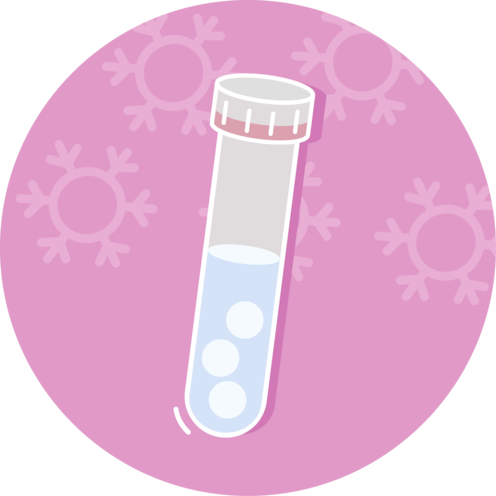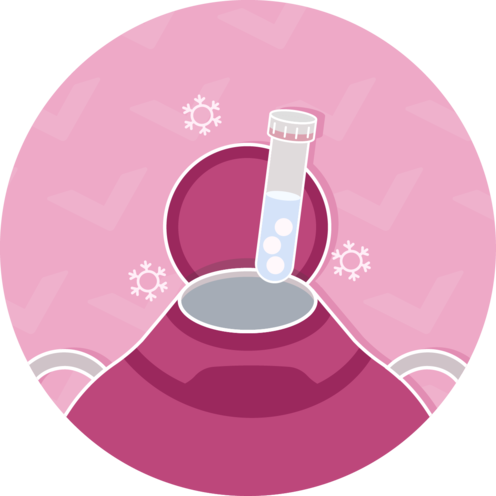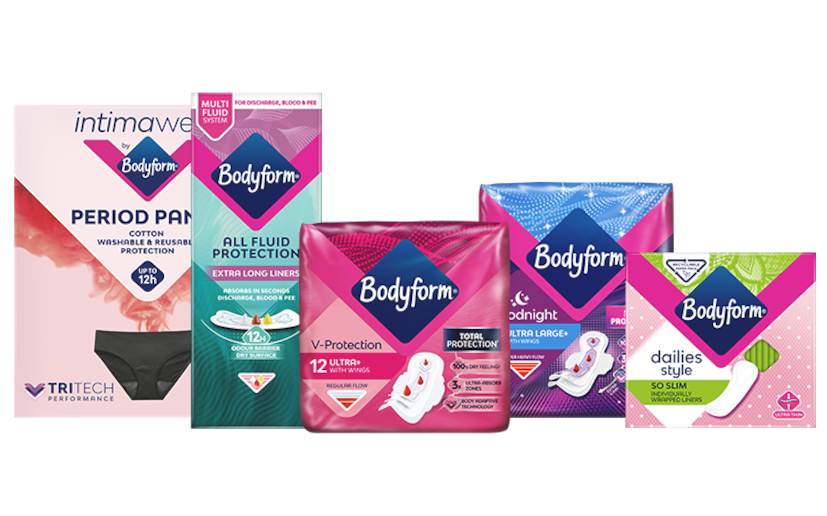What is egg freezing?

For many, the topic of fertility can be complex and filled with uncertainties, whether you're facing challenges with a partner, considering your options in a same-sex relationship, or choosing the path of single parenthood. Freezing your eggs allows you to preserve your fertility, giving you the flexibility and peace of mind to plan for the future at your own pace. Understanding this process can help you explore if egg freezing is the right option for you and your fertility plans
Choosing whether or not to have children at a certain point in your life is a huge decision, with a lot of factors to consider. But if you want to press pause on the fertility clock for a while, egg freezing could be an option for you.
Let's take a deep dive into all things egg freezing, how it works, if it's right for you and what you can expect if you do choose to take this path to future fertility.
So, what exactly is egg freezing?
Egg freezing, as the name suggests, is a method of fertility preservation that allows you to freeze and save your eggs for later. If you're looking for more control over when to have children and start a family, this option may be worth considering. It could be because you aren’t quite ready to have children yet or you're considering having kids but aren’t quite sure, whether due to personal, career, or health reasons.
If you’re navigating health challenges or treatments that could affect fertility down the road, egg freezing can offer a comforting option to keep your choices open. For example, if you have a family history of premature menopause or chronic illness, freezing your eggs could be worth exploring.
You might also choose to freeze your eggs for egg donation, to give someone else an opportunity to use them to start their own family. Whatever your reasons are for choosing to freeze your eggs, the decision is always down to you, and it's all about what feels best for your future.
How does egg freezing work?
If you’re considering egg freezing, it’s natural to have questions about what actually happens during the process. To make things as clear and comfortable as possible, we’ll walk you through each step—from your first consultation to the actual egg collection. Having a better understanding of what to expect can make the whole journey feel less overwhelming.
1. Your health and fertility check-in
First, you'll have what’s called a Fertility MOT. It’s a simple process where you’ll go over your medical history and do a few blood tests and scans to get a clear picture of your fertility health and spot any possible concerns early on. These tests help you understand your reproductive health and give you an idea of what to expect with fertility treatment. Once that’s complete, your clinic will be ready to start the egg collection process.
2. Your eggs will be collected
The process of egg collection and freezing is pretty fascinating. Instead of producing one viable egg per month like you would during your natural cycle, your fertility specialist (you'll probably hear them be called a reproductive endocrinologist) helps your ovaries produce a batch of eggs to increase your ovarian reserve (the number of potentially viable eggs you have). This is called ovarian stimulation and is usually done through hormone injections.
On average, this process takes 1-3 treatment cycles to reach the desired number of eggs.[1] Once they’re ready, the doctor carefully removes them and freezes them. To remove the eggs, your doctor will insert a thin needle through your vaginal wall to reach your ovaries, then, using a little bit of suction, the eggs are retrieved one by one. You'll be put to sleep while all of this happens, so you won't feel a thing.

3. Then the eggs are frozen
To start the freezing process, known as vitrification or flash freezing, your eggs are treated with special solutions called cryoprotectants. These are like protective shields that prevent ice crystals from forming during freezing, which helps keep the eggs healthy.
Then, the eggs are quickly frozen to a super chilly temperature of around -196°C using liquid nitrogen. This fast freezing is super important because it helps preserve the eggs for the long term without any damage during storage or the thawing process. After this, they're stored in liquid nitrogen tanks at a fertility clinic, ready for whenever you might want to use them.

4. You have the option to use your eggs
If you do decide to use your frozen eggs, they are taken out of storage and thawed out (but not in the exact same way as the food in your freezer) then fertilised with sperm. This creates an embryo, which can be implanted to begin a pregnancy, or be frozen again, known as embryo freezing.
There will often be medications involved in the process too, from hormonal medications to help you produce the eggs, to supplements to support you after retrieval. If you're feeling uneasy about taking any medications, your fertility team will talk you through the process and make sure they choose the best ones for you.
How long can the eggs be frozen for?
The amount of time you can keep your eggs frozen will depend on the country you live in and the specific clinic you use. Some countries have limits on this, while others let you store them for as long as you want. Some countries offer extensions to the storage limits for medical reasons, and some are considering offering these same extensions if you choose to freeze your eggs for personal reasons too.
Be sure to research how long you can keep your eggs in storage in your country so you don't feel pressured by a time limit as you consider your fertility future.

Is freezing my eggs painful?
The egg freezing process isn't generally considered painful, but some discomfort can occur along the way. During the hormone injections, many people report bloating or mild cramping, similar to PMS symptoms, but some people say the injections are less painful than other injections like blood tests. You'll be put to sleep for the actual egg retrieval, so you won’t feel a thing. Afterwards, you might experience some soreness or cramping, but over-the-counter pain relief should be enough to help you out. Overall, while the process might cause temporary discomfort, most people wouldn’t consider the entire process painful.
Everyone experiences pain during egg freezing differently, some people don't find it painful at all, other struggle with it a bit more. So don’t hesitate to check in with your doctor about how you're feeling and share any concerns you have.
Any doctor's appointment can be overwhelming, so if you're feeling nervous, see if your partner, a friend or a family member can come with you. If they can, it's a good idea for them to stay with you for a while after your appointment to help and support you if you need it.
Is egg freezing right for me?
Deciding if egg freezing is the right option for you is a personal journey, and it's completely okay to take your time to think it through. If you're feeling uncertain about when (or even if) you want to start a family, or if you’re focusing on other priorities like your career or personal growth, egg freezing can provide you with some peace of mind. It allows you to preserve your options for the future while giving you the flexibility to wait until you feel ready.
However, there are certain factors that may mean other options might be more suitable for you, and possibly even have a higher success rate if you do decide to start a fertility journey.
Your egg quality may naturally change as you age
As you approach your mid-30s, it’s important to know that your fertility can start to decline more noticeably after the age of 35. This means that the quality of your eggs could be lower, which can affect the success rates of freezing and having a successful pregnancy. While egg freezing can still be a viable option, other methods like certain types of In Vitro Fertilisation (IVF) can be effective at an older age.[2]
Certain health conditions or treatments can affect egg retrieval
Some health issues or even a family history of certain medical conditions can make retrieving your eggs more difficult, such as severe uncontrolled diabetes or certain autoimmune diseases. Egg freezing may still be possible, but you might need to have additional tests and more in-depth chats with your doctor to decide if it's the best option for you.
While egg freezing is a great option before undergoing certain medical treatments, if you've already had treatments like chemotherapy, the chances of a successful egg retrieval procedure are also reduced.
The whole process can take some time and can be expensive
From start to finish, egg freezing can take between 2-3 weeks, which is quite a bit of time to invest especially if you have other things going on in your life.[3] However, if you feel that it’s the right decision for you and believe it’s worth it, then this time can really pay off when it comes to your peace of mind and options later on.
If you opt for egg freezing through a private clinic or fertility treatment isn't free where you live, the cost of egg freezing can add up quite quickly. You might also need more than a single cycle of treatment to make sure a good number of eggs can be collected, so make sure you account for that possibility too.
To give you an idea, these are the kinds of things you'll need to budget for:
- The procedure itself (collection and freezing)
- Medications
- Annual storage fees
If you're concerned or have any questions about egg freezing costs, your fertility clinic can talk you through your treatment plan and what to expect. Some or maybe even all of the costs might be covered by an insurance plan if you have one, but make sure to check with your provider first. You can also find out if payment plans are available to help you stretch the cost.
There can be complications
Like with any treatment, egg freezing has some risks. The main one is Ovarian Hyperstimulation Syndrome (OHSS), where the ovaries can swell and get a bit painful, though it’s more common with IVF. There’s also a small chance of a pelvic infection when the eggs are collected, but that’s super rare, and your clinic will take all the steps to make sure it doesn’t happen.[4]
It's important to have open conversations with your doctor about your goals and any concerns you may have. Remember, whatever you choose, it's about what feels right for you and your unique circumstances.
How likely is it that egg freezing will work?
It's important to bear in mind that no fertility treatment has a 100% chance of working. The success rate of egg freezing will vary case by case, depending on your individual circumstances. To give you some general perspective, in a study involving 559 people who received frozen donor eggs between 2017 and 2019, the live birth success rate was 37.9% per embryo transfer. After three embryo transfers, the chances of having a live birth increase to over 60%.[5]
Egg freezing offers a unique opportunity for women+ to take control of their reproductive health and future. Whether it's for medical reasons or simply to provide more time and flexibility to prioritise other aspects of life, it's a deeply personal decision that deserves thoughtful consideration. While there's no guarantee of success, for many, it can bring a sense of empowerment and peace of mind. If you're thinking about egg freezing, it’s always a good idea to chat with a healthcare provider to get a clear picture of the process and what it could mean for you.
Whether you're going on this journey with a partner or a choice you're making for yourself, it can also be really comforting to reach out to friends and family for support. Even checking out online forums can be useful, so you can hear first-hand from others who’ve been through it. Remember, your path to potential parenthood should be guided by what feels right for you, whether that's raising a large family or even living child-free by choice. If you're not sure about going down the egg freezing route, there are a number of other treatment options you can try that might work better for you.
To continue learning about all things fertility, potential parenthood and more, consider signing up for our newsletter.
Medical disclaimer
The medical information in this article is provided as an information resource only and is not to be used or relied on for any diagnostic or treatment purposes. Please consult your doctor for guidance about a specific medical condition.
This article has been reviewed on 6th January 2025 by Karen Joash BSc (Hons), MSc, MBBS, MRCOG PGCert, ILM and MBA, Consultant Obstetrician and Gynaecologist at Queen Charlotte's and Chelsea Hospital. You can find out more about Dr Karen on her Instagram, LinkedIn and X pages.
References:
[1] https://www.londonwomensclinic.com/egg-freezing/about-egg-freezing/
[2] https://www.createfertility.co.uk/fertility-treatments/ivf-for-women-over-40
[3] https://www.healthline.com/health/egg-freezing-process#timeline
[4] https://guysandstthomasspecialistcare.co.uk/treatments/egg-freezing-and-storage/
[5] https://www.londoneggbank.com/egg-freezing-and-sharing/success-rates/
Continue Learning


